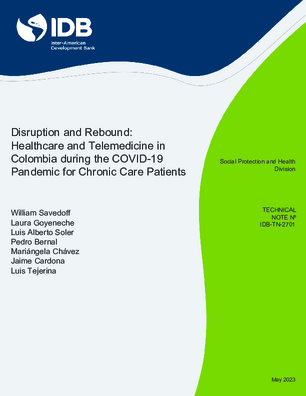Disruption and Rebound: Healthcare and Telemedicine in Colombia during the COVID-19 Pandemic for Chronic Care Patients
Date
May 2023
The COVID-19 pandemic led to declines in in-person consultations and substantial increases in telemedicine use in many countries. This paper investigates whether this pattern occurred in Colombia using data for people with particular health conditions prior to the pandemic (rheumatoid arthritis, hemophilia, chronic kidney disease, HIV, and cancer). The study shows that healthcare utilization by people in Colombia with these conditions dropped significantly during the first months of the pandemic relative to the average of the previous two years. However, by the end of 2020, the rate of healthcare utilization had almost reached pre-pandemic levels. While the number of services fell for people in both the contributive and subsidized scheme, the share of people who had any contacts with healthcare providers each month declined substantially for those in the subsidized scheme and by a statistically insignificant amount for those in the contributive scheme. Declines in utilization and contacts for in-person consultations were partially offset by the increased use of telemedicine services which accounted for almost one-fifth of healthcare contacts by December 2020. Of the main explanations for healthcare disruptions, the diversion of healthcare resources to treat COVID-19 patients does not seem to have been as significant as changes in social mobility and government lockdown policies.
These findings have a variety of implications for public policy, including: the need to address the causes of healthcare utilization declines among individuals in the subsidized scheme; the importance of incorporating better social communication and adjustments to lockdown policies when planning for future health emergencies; the value of expanding telemedicine, not only during emergencies but also during normal times; and the potential benefits from improving the quality and availability of administrative data so that future research can contribute more effectively to policies that promote greater equity and effectiveness in Colombian healthcare services.
These findings have a variety of implications for public policy, including: the need to address the causes of healthcare utilization declines among individuals in the subsidized scheme; the importance of incorporating better social communication and adjustments to lockdown policies when planning for future health emergencies; the value of expanding telemedicine, not only during emergencies but also during normal times; and the potential benefits from improving the quality and availability of administrative data so that future research can contribute more effectively to policies that promote greater equity and effectiveness in Colombian healthcare services.




